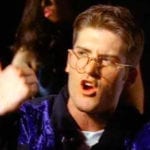 History
History  History
History  Weird Stuff
Weird Stuff 10 Wacky Conspiracy Theories You Will Need to Sit Down For
 Movies and TV
Movies and TV 10 Weird Ways That TV Shows Were Censored
 Our World
Our World 10 Places with Geological Features That Shouldn’t Exist
 Crime
Crime 10 Dark Details of the “Bodies in the Barrels” Murders
 Animals
Animals The Animal Kingdom’s 10 Greatest Dance Moves
 Movies and TV
Movies and TV 10 Box Office Bombs That We Should Have Predicted in 2025
 History
History 10 Extreme Laws That Tried to Engineer Society
 History
History 10 “Modern” Problems with Surprising Historical Analogs
 Health
Health 10 Everyday Activities That Secretly Alter Consciousness
 History
History 10 Dirty Government Secrets Revealed by Declassified Files
 Weird Stuff
Weird Stuff 10 Wacky Conspiracy Theories You Will Need to Sit Down For
 Movies and TV
Movies and TV 10 Weird Ways That TV Shows Were Censored
Who's Behind Listverse?

Jamie Frater
Head Editor
Jamie founded Listverse due to an insatiable desire to share fascinating, obscure, and bizarre facts. He has been a guest speaker on numerous national radio and television stations and is a five time published author.
More About Us Our World
Our World 10 Places with Geological Features That Shouldn’t Exist
 Crime
Crime 10 Dark Details of the “Bodies in the Barrels” Murders
 Animals
Animals The Animal Kingdom’s 10 Greatest Dance Moves
 Movies and TV
Movies and TV 10 Box Office Bombs That We Should Have Predicted in 2025
 History
History 10 Extreme Laws That Tried to Engineer Society
 History
History 10 “Modern” Problems with Surprising Historical Analogs
 Health
Health 10 Everyday Activities That Secretly Alter Consciousness
10 One-Hit Wonders Who Found Music-Industry Success in an Alternative Role
One-hit wonders usually follow one of two paths after their hit song: Some continue making music for their small group of fans despite their lack of continued chart success, while others quit making music entirely and find so-called “real world” jobs. But there are also a small number of one-hit wonders who continued to make a huge impact in the music industry after their single chart-topping success—they just weren’t in the spotlight themselves. Here are 10 such one-hit wonders and what they did next.
Related: 10 Extreme Controversial Bands And Musicians
10 Elliot Lurie from Looking Glass
“Brandy (You’re a Fine Girl)” was released by Looking Glass in 1972 and quickly reached the coveted No. 1 spot on the Billboard Hot 100. Its inclusion in Guardians of the Galaxy Vol. 2 (2017) gave the song another bump in popularity many years later. Writer and co-vocalist Elliot Lurie didn’t let the band’s one-hit-wonder status stop him from working in the music industry, though.
In 1984, after a brief and commercially unsuccessful stint as a solo artist, Lurie began a career in LA as a music supervisor for movies and TV. He soon became the executive in charge of music for 20th Century Fox—now known as 20th Century Studios. He has been the music supervisor for hundreds of popular films, from Die Hard 2 (1990) to Miracle on 34th Street (1994). He worked at Fox for 10 years and then went independent, during which time he wrote the theme song for the Lizzie McGuire TV show.[1]
9 Ray Dorset from Mungo Jerry
Mungo Jerry is remembered for their 1970 hit “In the Summertime,” but 10 years later, frontman Ray Dorset scored another hit by writing “Feels Like I’m in Love,” sung by Kelly Marie. Dorset had written “Feels Like I’m in Love” with Elvis Presley in mind, but then the King of Rock and Roll died. Dorset and Marie happened to be in the same studio one day, with Marie recalling, “he heard me singing and said that I had a great voice.” He asked if she wanted to try singing a song he had written, so the pair “sat in a wee control room and he had his guitar, and I sang it.”
Marie recorded the song, and in 1980, it spent two weeks at No. 1 on the UK charts. Although Kelly Marie, like Mungo Jerry before her, was relegated to being a one-hit wonder, “Feels Like I’m in Love” has continued to be popular, being included in the TV show It’s a Sin and in McDonald’s commercials.[2]
8 Matthew Wilder
Matthew Wilder’s 1983 single “Break My Stride” reached No. 5 on the Hot 100, and then in 2020, the song went viral on TikTok, to which Wilder said, “I’m astonished, and I’m thrilled.” Although the rest of his music didn’t gain much traction, he has written and produced for a slew of huge artists, including No Doubt, Christina Aguilera, and Kelly Clarkson.
Wilder has also worked closely with Disney over the years. He was a composer, producer, and instrumentalist for Mulan (1998). He even provided the singing voice for Ling—the skinny soldier who befriends Mulan. As well as writing and producing music for Miley Cyrus’s character Hannah Montana, he also co-wrote “What Dreams Are Made Of” for The Lizzie McGuire Movie (2003).[3]
7 Gregg Alexander from New Radicals
Not long after the success of “You Get What You Give” in 1998, the New Radicals broke up. In a press release stating his intention to focus on writing and producing, Gregg Alexander said he realized that “getting three hours sleep in a different hotel every night to do ‘hanging and schmoozing’ with radio and retail people is definitely not for me.” He went on to say that he “lost interest in fronting a ‘One Hit Wonder’ to the point that I was wearing a hat while performing so that people wouldn’t see my lack of enthusiasm.”
Alexander ended up writing “Life Is a Rollercoaster” for Ronan Keating, “Murder on the Dancefloor” for Sophie Ellis-Bextor, and “The Game of Love” for Santana feat. Michelle Branch, which won a Grammy. Gregg also wrote the music for the 2013 film Begin Again, working with former bandmate Danielle Brisebois to write the film’s lead song, “Lost Stars,” which is performed by Adam Levine from Maroon 5 and was nominated for an Oscar.
Alexander has retreated from and returned to the music industry a number of times over the years. In a 2018 interview with Billboard, he attributed this to a “disillusionment of a lot of the superficial aspects of the music business.” He went on to describe himself as “a lost star, in some respects, because maybe I walked away from my larger, true destiny if I had had seven albums out by now.”[4]
6 Dan Wilson from Semisonic
Although Semisonic have a few albums to their name, nothing has made as big an impact as their Grammy-nominated 1998 song “Closing Time.” However, frontman Dan Wilson has a couple of other hit songs that have won Grammys—they just aren’t sung by him. He co-wrote “Not Ready to Make Nice” with The Dixie Chicks—now known as The Chicks—which won three Grammys in 2007. He also co-wrote “Someone Like You” with Adele, which won the Grammy for Best Pop Solo Performance in 2012.
Wilson has also written and produced songs for other massive artists, including Taylor Swift (“Treacherous” and “Come Back… Be Here”), Nas (“Roses), Pink (“The Great Escape”), Weezer (“California Kids” and “Ruling Me”), and Keith Urban (“Big Promises”). Rather than having songs prewritten and then offered to artists, he explains that “I’m much more likely to get together with somebody in the moment and get swept up in conversation, or maybe they have a title, or I have a title, or I have a couple lines of melody, and we work from there.”[5]
5 David Fenton from the Vapors
When the Vapors broke up not long after the success of their 1980 single “Turning Japanese,” lead vocalist and guitarist David Fenton said he “spent the next 10 years writing, performing, sound engineering, producing, managing bands, and generally avoiding a 9-to-5 office job.” But before the Vapors signed a record deal, Fenton had qualified as a lawyer, and in 1993, he combined his legal training with his knowledge of the music industry to become the in-house attorney for the Musicians’ Union.
Essentially, Fenton’s job involves “giving legal advice to members or colleagues, answering their queries and advising on contracts, band bust-ups, copyright ownership, trademark infringement, or even simply how the music industry works.” He provides a crucial service for musicians, with the most common problem he deals with being “non-payment for, or cancellation of, work, whether that be a gig, a recording session, a composing commission, a tour, etc.”[6]
4 Adam Schlesinger from Fountains of Wayne
Before “Stacy’s Mom” took over the airwaves in 2003, Adam Schlesinger from Fountains of Wayne had actually already had a hit a few years earlier with “That Thing You Do!” from the 1996 Tom Hanks movie of the same name. Schlesinger described his submission of the song as “a shot in the dark. It wasn’t like I was hired to do it.” Hanks plucked it from the demo pile and had Schlesinger co-produce the song, with Mike Viola providing the vocals. It proved to be a hit in the real world as well as in the movie, peaking at No. 41 on the Billboard Hot 100.
Fountains of Wayne has six albums, but no song rose to the heights achieved by “Stacy’s Mom”—which reached No. 21. But Schlesinger scored numerous hits by writing for other artists. His biggest success was “Just the Girl” by The Click Five, which reached the No. 11 spot. He also wrote “I Am What I Am” for the Jonas Brothers and co-wrote “High School Never Ends” with Bowling for Soup. He won a Grammy for his work on A Colbert Christmas: The Greatest Gift of All! (2008) and three Emmys for his songs on the TV show Crazy Ex-Girlfriend.[7]
3 Mark Mothersbaugh from Devo
Although Devo continued to make music after their 1980 single “Whip It,” they never found such widespread success again. But it was Devo’s floundering that led frontman Mark Mothersbaugh to his new career. “Devo was in a situation where we were kind of on hold because our record company that we signed to was collapsing, and it put us in kind of a netherworld,” he told Entertainment Weekly in 2017. Mothersbaugh had time on his hands, so when his friend Paul Reubens, who created and played the character Pee-Wee Herman, asked him to write music for Pee-wee’s Playhouse, he agreed.
That job set Mothersbaugh on the path to founding a music production company in 1989, Mutato Muzika. He described it as “a very interesting change, a step to the side, while still kind of going in the same direction.” Mothersbaugh has composed the music for huge movies like The Lego Movie (2014) and Thor: Ragnarok (2017) and has scored numerous Wes Anderson films, including Rushmore (1998) and The Royal Tenenbaums (2001). His company has also created the music for video games, such as The Sims and Crash Bandicoot, and classic childhood TV shows, such as Rugrats. [8]
2 Linda Perry from 4 Non Blondes
Linda Perry left 4 Non Blondes shortly after the success of their 1993 song “What’s Up?” and ended up writing pop hits for other artists and founding two record labels, Rockstar Records and We Are Hear. While messing around with some new music software and singing “every clichéd line I can think of,” she wrote “Get the Party Started.” Then she called her manager to say, “I just wrote a damn hit.” The song was given to Pink and went to No. 4 on the Hot 100. She then gave her comeback song, “Beautiful,” to Christina Aguilera, which charted at No. 2 and won a Grammy.
Perry has worked on solo music, but she has also continued to write and produce for other artists, including Gwen Stefani, Kelly Osbourne, and Alicia Keys. She’s picky about who she lets sing her songs, though, saying, “I don’t just give songs to people. They have to earn them.”[9]
1 Trevor Horn from The Buggles
The Buggles are remembered for “Video Killed the Radio Star,” which became the first music video ever shown on MTV in 1981. The English duo quickly fizzled out after that, although they both joined Yes for a short stint. While Geoff Downes went on to form Asia, Trevor Horn went into music production, founding ZTT Records in 1983.
Horn has produced many massive hits over the years, including Yes’s only No. 1, “Owner of a Lonely Heart,” which the band initially deemed “too poppy.” Horn had to beg them to record it. “I literally got down on my knees and started pulling at [bassist] Chris Squire’s trousers, pleading with them,” he told the Guardian in 2022. Horn also produced Frankie Goes to Hollywood’s biggest hits, “Relax,” “Two Tribes,” and “The Power of Love,” as well as Grace Jones’s album Slave to the Rhythm.
Horn has produced for other artists, including Seal, Robbie Williams, Pet Shop Boys, and Tina Turner. He also produced the song “Can’t Fight the Moonlight” for the 2000 film Coyote Ugly.[10]








